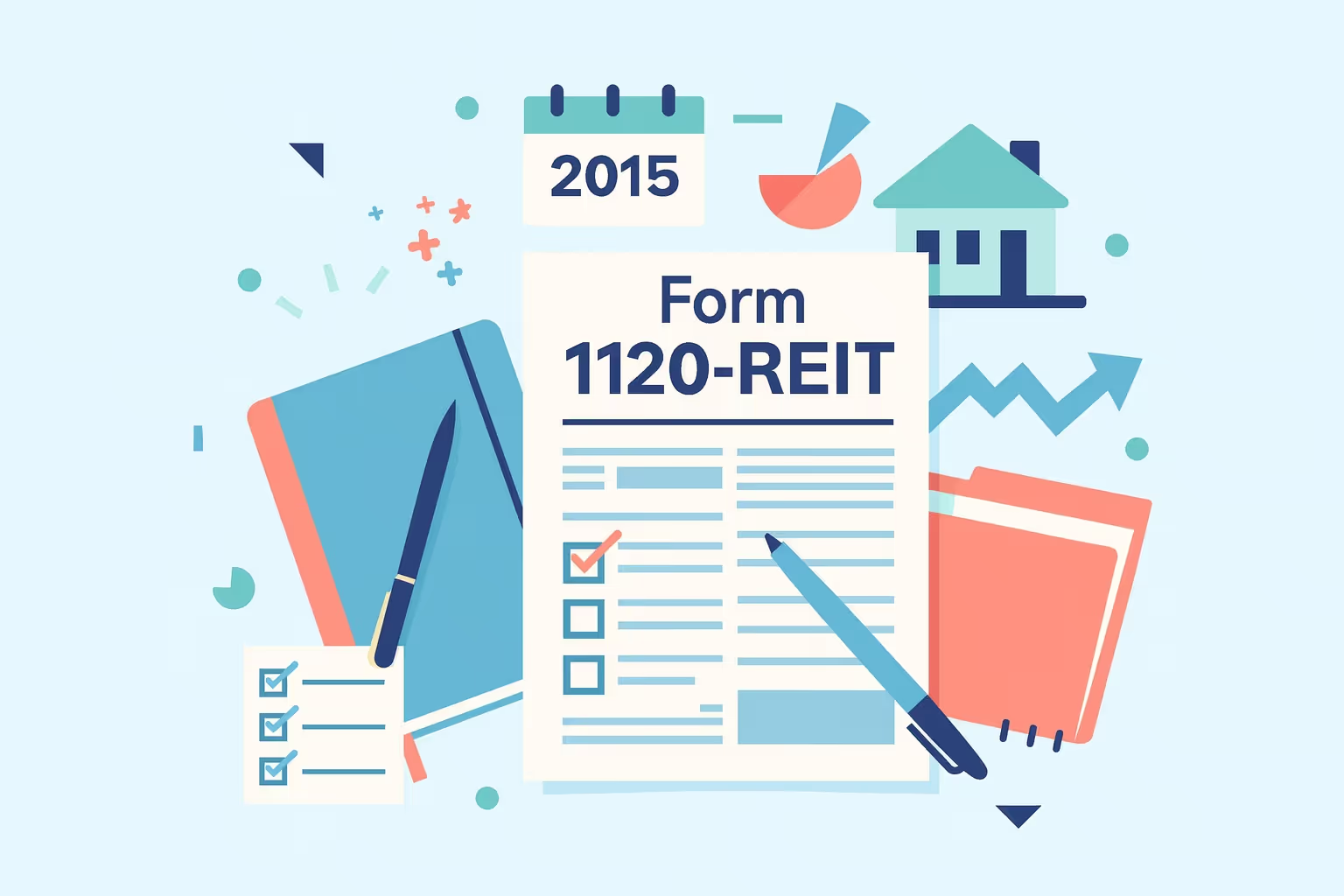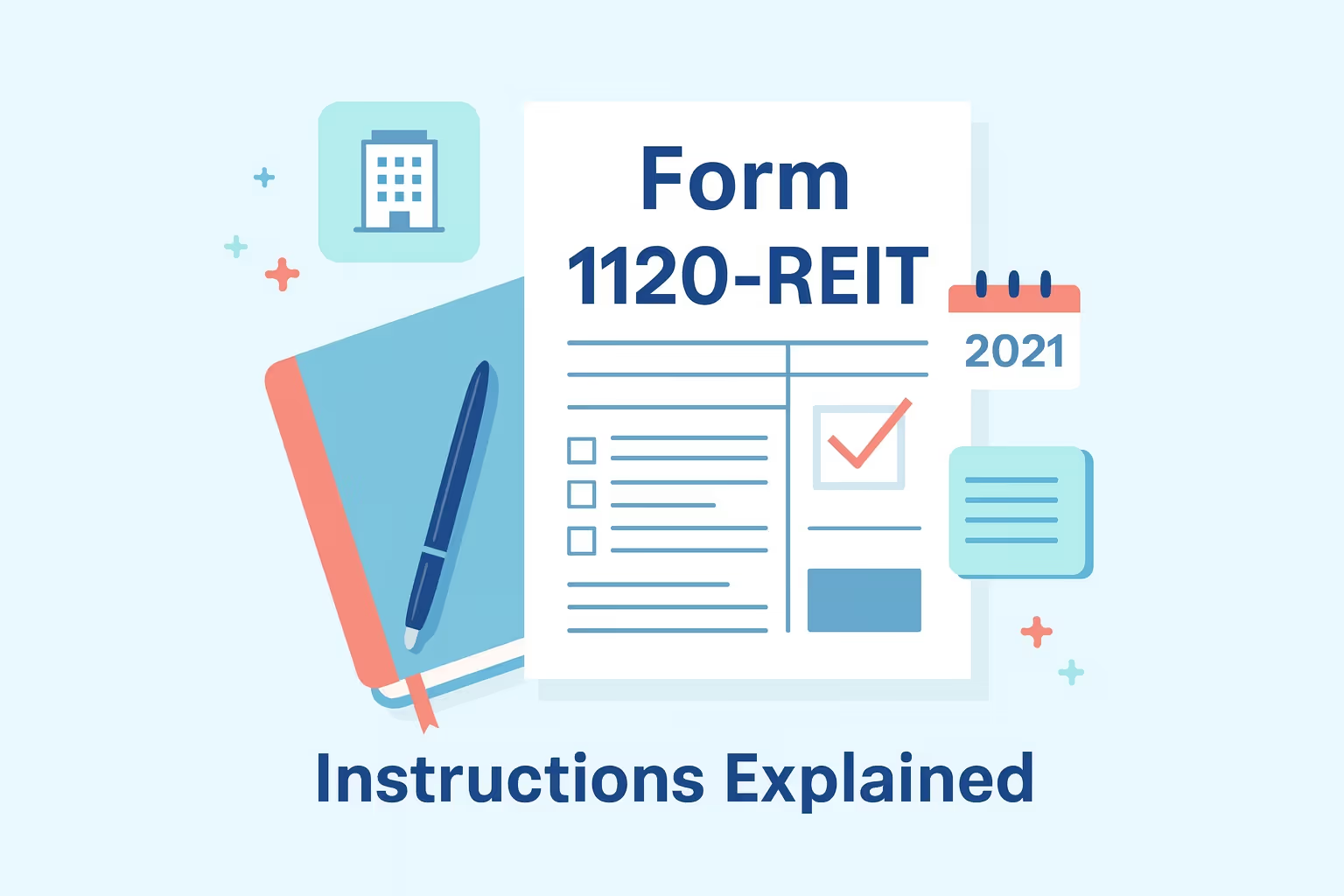
What IRS Form 1120-REIT (2019) Is For
IRS Form 1120-REIT (2019) is the income tax return that real estate investment trusts must file to report income, deductions, credits, and penalties for the taxable year. A real estate investment trust uses this form to show how it meets annual income tests, distribution rules, and asset requirements.
A corporation, trust, or association must file Form 1120-REIT if it previously elected REIT status and continues to qualify under the definition outlined in the IRS instructions. The form applies to equity REITs, mortgage REITs that hold mortgages or obligations secured by real property, and companies that invest in real estate assets or rents derived from properties.
The return covers taxable income, dividends paid, capital gains, and details from prior years that affect the current year’s account balances. REITs generally distribute most of their money to shareholders, which keeps them taxed as pass-through entities rather than regular corporations. Individual investors holding REIT shares rely on accurate reporting because the REIT’s gross income and distribution activity determine their dividend amounts and how much tax they may owe.
For a detailed breakdown of filing requirements, eligibility rules, and updates for this version, see our Form 1120-REIT 2019 Instructions for REIT Tax Returns.
When You’d Use Form 1120-REIT for 2019 (Late or Amended Filing)
You may need to file a late or amended tax return for 2019 if your REIT did not file Form 1120-REIT by the original due date or if errors were found when reviewing forms from prior years. A late filing may occur when a company receives IRS notices, encounters an error in reporting income, or identifies issues with a taxable REIT subsidiary. If the REIT’s second taxable year also had problems, the IRS may ask for additional letters, forms, or proof showing that the trust continues to qualify.
Refund claims for 2019 expired on April 15, 2023. However, filing is still required to address penalties, register the completed return in IRS systems, and ensure the REIT can file future obligations without interruption. Even without a refund, the IRS expects REITs to file, pay any remaining tax, and report all income from the taxable year.
Key Rules Specific to 2019
- 90% distribution test: A REIT must distribute dividends equal to at least 90 percent of taxable income to maintain its status and avoid being taxed as a regular corporation.
- Gross income tests: Annual income tests require that 75 percent of income consist of rents from real property, interest on mortgages, or other real estate investment sources, and 95 percent come from passive sources.
- Asset diversification: A taxable REIT subsidiary (TRS) cannot exceed 25 percent of the REIT’s asset value, and assets must not be held indirectly in a way that causes the REIT to fail the rules.
- Late-filing penalties: Penalties have increased to a minimum of $435 for returns filed more than 60 days late, and interest may be applied until taxes are fully paid.
- Ownership limits: No more than five individuals may own more than 50 percent of the REIT’s stock during the last half of the taxable year, and trustees or directors must monitor these limits.
For complete details on wage reporting, withholdings, and unemployment tax filings, see our guide to Form 1120-REIT – Real Estate Investment Trusts.
Step-by-Step (High Level)
- Gather transcripts: REITs should find and review IRS transcripts using Form 4506-T to confirm account activity, payments, and prior notices before completing the return.
- Complete Form 1120-REIT (2019): Apply all qualification tests to the income tax return and ensure the form reflects income, rents, obligations secured by property, and dividends.
- Attach required schedules: Attach Schedule A for the dividends paid deduction, Schedule D for capital transactions, and all other forms in the order specified by IRS instructions.
- Submit the return: File the return by mailing the completed PDF version to the correct IRS service center or using an approved e-file option if available for amended returns.
- Keep records: Maintain copies of all forms, statements of value, guarantees, notes, and documentation showing how tests apply to the REIT’s properties and assets.
Common Mistakes and How to Avoid Them
- Miscalculated dividends paid deduction: REITs must distribute the correct dividend amount to comply with distribution rules; reviewing calculations helps prevent this error.
- Ignoring asset tests: Failing diversification tests can disqualify a REIT's status; reviewing asset values annually helps avoid this issue.
- Misclassified income sources: Incorrectly categorizing income may cause failure of the 75 percent or 95 percent tests; checking how income is derived ensures compliance.
- Omitted schedules: Missing required schedules can cause delays in processing. Verifying all attachments before filing helps avoid this problem.
- Incorrect fiscal-year filing: Fiscal-year REITs must file based on their chosen period; confirming the correct due date prevents penalties.
- Insufficient ownership records: Failing to document shareholders or having fewer individuals controlling REIT shares risks disqualification; maintaining accurate records helps meet these requirements.
What Happens After You File
After you file the IRS Form 1120-REIT (2019) income tax return, the IRS generally processes paper submissions within 8–12 weeks. Late or amended returns may take longer to process. The IRS may send notices requesting additional details, confirming receipt, or highlighting inconsistencies in income, dividends, or the reported value of assets.
Interest and penalties continue to apply until all taxes are paid. If the REIT cannot pay tax immediately, it may request a payment plan using Form 9465. Individual investors and shareholders are entitled to updated information once corrections are made.
FAQs
Can I still receive a refund for IRS Form 1120-REIT (2019) even if my real estate investment trust filed its return late?
Refunds for this income tax return expired on April 15, 2023. Although no refund is available, the REIT must still file to report income, dividends, and assets for the taxable year. Filing helps limit penalties and ensures the trust remains in good standing with the IRS.
What penalties apply when real estate investment trusts file a late income tax return for 2019?
Penalties include 5 percent of the unpaid tax for each month the return is late, up to a maximum of 25 percent of the unpaid tax. If the return is filed more than 60 days late, the minimum penalty is $435 or the full tax due, whichever is greater. Interest also applies until taxes are paid.
Do I need transcripts to file an amended tax return for a real estate investment?
Transcripts are not required but are helpful. They display income, payments, and account activity from prior years, enabling the REIT to avoid duplicate reporting and overlooked items. Transcripts are available online; however, users may encounter a locked padlock icon when accessing secure pages.
What if my real estate investment trust failed IRS tests for the taxable year?
If a REIT fails tests relating to income, assets, or ownership, it risks losing REIT status and being taxed as a corporation. Some issues may be corrected if reasonable cause is shown. In some instances, the IRS allows a REIT to pay a penalty to maintain its status.
Should I file amended state income tax returns after completing IRS Form 1120-REIT (2019)?
Most states require an amended state tax return when the federal return changes. Requirements depend on state rules, and some may impose additional penalties or taxes. Reviewing each state’s rules helps ensure full compliance.
For more resources on filing or understanding prior-year IRS forms, visit our Form Summaries and Guides Library.



































